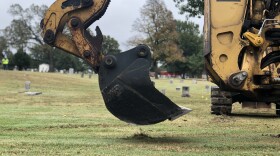With mounting global attention on Tulsa and the myriad events planned to commemorate the 100th anniversary of the 1921 Tulsa Race Massacre, reparations advocates have launched a phone hotline for descendants of massacre survivors and victims to call and tell their stories.
"I know there's thousands and thousands of more descendants across the world and across the nation," said DJ Mercer, descendant coordinator at the Justice For Greenwood Foundation, which opened the hotline last week.
Mercer said it's important that the foundation document as comprehensive a list of descendants and their stories as possible as they make their legal and moral arguments for reparations, which have never been paid by the city, county or state.
"It's important for descendants to reach out to us so that we know exactly what we're fighting for and what each family can make claims for," Mercer said. "For example, if a family had a grocery store that was burned down that was never rebuilt, that was never given unpaid insurance claims, that way we can go to the courts and say, like, look: this family, who is now probably in California, Texas, some place other than Tulsa, Oklahoma -- they had this prosperous grocery store, they were pillars of the community, and now this family, this talented family, is not in Tulsa, is not even in Oklahoma, but they still deserve what their ancestors built."
Mercer said Tuesday that 150 descendants had reached out so far, but he expects many more to call over the coming days given how many descendants likely exist.
"The estimates say that 300 people were murdered in Greenwood, and that's just the ones that they counted," Mercer said. "We're not even thinking about and talking about the families that had just gone missing, the babies that were killed, the babies that were taken and snatched away, those are just the countable numbers from 300 that were murdered. And imagine the people who did flee, the people who did make it out. So, I don't know the number but I know it's over 1,000, for sure. Easy. I wouldn't even cap it at 10,000."
Mercer said while he is hopeful the centennial will bring renewed attention and move the needle toward the city and other entities finally paying restitution for the atrocities they aided and helped carry out a century ago, the groundwork will still continue for local advocates.
"My fear is that once the centennial is done, people will move onto the next thing. But we as Justice For Greenwood, we as residents of Tulsa, specifically north Tulsa, we will still be here despite the fanfare being gone," Mercer said. "Hopefully this moves the needle. You know, having our survivors go to Congress and testify and give their testimonials was a huge and historic moment for Greenwood, but we need to continue to really put the pressure on the powers that be, because this has been 100 years and they haven't paid reparations, they haven't given compensations for the descendants of Greenwood, and that's by design. They don't want to. So we've still got to put pressure on them, no matter what happens after the centennial."
Damario Solomon-Simmons, an attorney who helps lead the Justice For Greenwood Foundation, is currently leading a lawsuit against the city of Tulsa, Tulsa County, and other entities for restitution on behalf of the three known living survivors of the massacre, alleging the defendants created a "public nuisance" that continues to this day.
Descendants can reach out to the Justice For Greenwood descendant hotline by phone at 918-209-3771.






